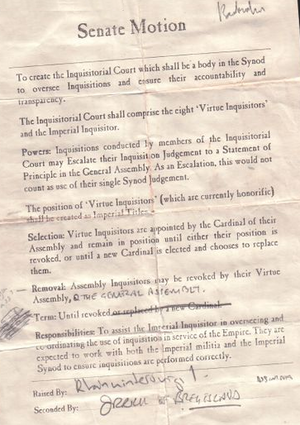Virtue inquisitor
(→Powers) |
mNo edit summary |
||
| Line 3: | Line 3: | ||
==Responsibilities== | ==Responsibilities== | ||
The intention of the Senate is that they Virtue inquisitors would form an ''Inquisitorial court'' in conjunction with the [[Imperial Inquisitor]], to oversee [[inquisition|inquistions]] and ensure their accountability and transparency. This inquisitorial court is also expected to work with the [[Officers_of_the_Law#The_Imperial_Militia|Imperial militia]] and the [[Imperial Synod]] to ensure inquisitions are performed correctly. | The intention of the Senate is that they Virtue inquisitors would form an ''Inquisitorial court'' in conjunction with the [[Imperial Inquisitor]], to oversee [[inquisition|inquistions]] and ensure their accountability and transparency. This inquisitorial court is also expected to work with the [[Officers_of_the_Law#The_Imperial_Militia|Imperial militia]] and the [[Imperial Synod]] to ensure inquisitions are performed correctly. | ||
==Powers== | ==Powers== | ||
===Inquisitor's Judgement=== | ===Inquisitor's Judgement=== | ||
Any priest who performs an [[inquistion]], they may choose to [[Inquisition#Escalation|escalate]] it to a [[condemnation]]. The virtue inquisitor has another option; they can instead choose to escalate their inquisition to a [[statement of principle]] in the [[The_Assemblies_of_the_Synod#The_General_Assembly|general assembly]]. As with a more traditional condemnation, this does not count as raising another Synod [[The_Judgments_of_the_Synod|judgement]] but is an extension of the inquisition. The intention of this power is that a virtue inquisitor who finds no fault, or who considers there to be insufficient grounds for a condemnation, may share their findings officially with the Imperial synod. | Any priest who performs an [[inquistion]], they may choose to [[Inquisition#Escalation|escalate]] it to a [[condemnation]]. The virtue inquisitor has another option; they can instead choose to escalate their inquisition to a [[statement of principle]] in the [[The_Assemblies_of_the_Synod#The_General_Assembly|general assembly]]. As with a more traditional condemnation, this does not count as raising another Synod [[The_Judgments_of_the_Synod|judgement]] but is an extension of the inquisition. The intention of this power is that a virtue inquisitor who finds no fault, or who considers there to be insufficient grounds for a condemnation, may share their findings officially with the Imperial synod. | ||
{{CaptionedImage|file=InquisitorialCouncil.png|caption=The motion to create the inquisitorial council|align=right|width=300}} | |||
==Selection== | ==Selection== | ||
A virtue inquisitor is appointed by the [[cardinal]] of their assembly. . | A virtue inquisitor is appointed by the [[cardinal]] of their assembly. . | ||
Revision as of 20:18, 22 August 2015
Overview
These Imperial titles were established by a vote of the Imperial Senate in Summer 379YE. There are eight virtue inqusitors in total - one for each of the virtue assemblies, and one for the assembly of the Way.
Responsibilities
The intention of the Senate is that they Virtue inquisitors would form an Inquisitorial court in conjunction with the Imperial Inquisitor, to oversee inquistions and ensure their accountability and transparency. This inquisitorial court is also expected to work with the Imperial militia and the Imperial Synod to ensure inquisitions are performed correctly.
Powers
Inquisitor's Judgement
Any priest who performs an inquistion, they may choose to escalate it to a condemnation. The virtue inquisitor has another option; they can instead choose to escalate their inquisition to a statement of principle in the general assembly. As with a more traditional condemnation, this does not count as raising another Synod judgement but is an extension of the inquisition. The intention of this power is that a virtue inquisitor who finds no fault, or who considers there to be insufficient grounds for a condemnation, may share their findings officially with the Imperial synod.
Selection
A virtue inquisitor is appointed by the cardinal of their assembly. .
Removal
A virtue inquisitor retains their title until they die, step down, are revoked, or until a new cardinal of their assembly is appointed and chooses to name a replacement.
A virtue inquisitor may be revoked by their respective Virtue Assembly or by the General Assembly.
History
The inquisitorial court was established in Summer 379YE.
